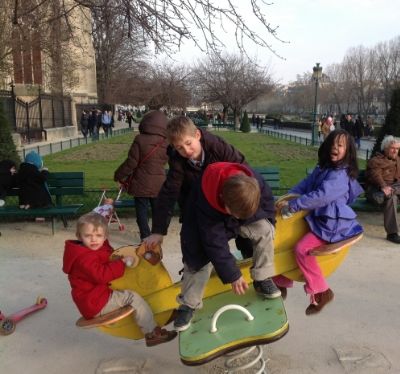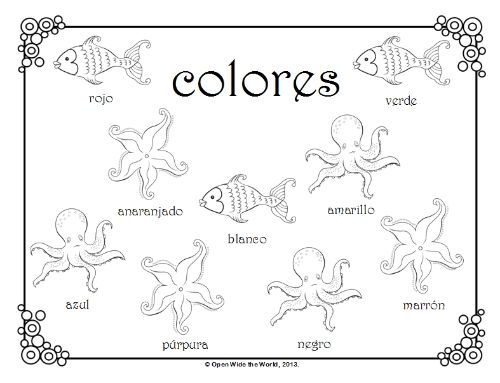From early in the course of this nation's history (the U.S., that is), immigrants have either wanted to, or were often forced to, assimilate to the prevailing culture and language. While that trend seems to be slowly changing,
generations of families have lost touch with their cultural and linguistic origins.
Such is the case with reader Jennifer: when she was growing up, she was somewhat embarrassed to use her family's native language of Spanish, and preferred to speak English exclusively. Now an adult, she regrets that decision, and hopes to create a different language vision for her own young family.
Fortunately, in today's world of endless e-resources, it is becoming easier and easier to reconnect with one's roots.
But with all those millions of resources available,
where does one even begin, as Jennifer asked, to introduce the language of heritage to a toddler? This question has as many answers as the number of people that you ask... so I'll just share where I began with Mag:
Placemats!
 |
| click for affiliated link |
Yes, you read that right: placemats. Three key elements will help explain placemats as
my starting point to introduce foreign languages to my then-18-month-old daughter.
1) I knew from my studies in
Speech-Language Pathology that second languages provide great cognitive benefits (
here and
here), so I was very excited to expose Mag to a second language, and
2) French is my first love, and is the language in which I am strongest, after English. So French is what I wanted to teach Mag... however,
3) This one was the kicker: I have absolutely no French language experience with anyone under the age of 13. Therefore, I don't know kids' vocabulary (like toy names) in French, or French story grammar (as in "and they lived happily ever after"), or many French "comptines" (nursery rhymes), or many French expressions used with children (like "faire dodo," kiddie slang for "to go night-night"). Basically,
I didn't know any age-appropriate French to teach my daughter.
 |
| click for affiliated link |
And then one day, as we were sitting at the table for snack time,
inspiration hit! On the table in front of Mag, covered in puffs and cheerios, was
a placemat by Crocodile Creek, with pictures of animals.
In the sing-songy intonation of American "motherese," which I could only hope worked in French, too, I said,
"Qui voudrait un cheerio?" (Who would like a cheerio?) And then I answered myself, still in sing-songiness, "Le cochon.
Le cochon voudrait un cheerio." (The pig. The pig would like a cheerio.) And I set the snack on the pig. Then Mag ate it.
After a few rounds of that, I asked the question "Qui voudrait un cheerio?"... but this time I waited for Mag to choose an animal by pointing to it. I then said the animal's name in French, and gave it a cheerio.
Thanks, I'm sure, to the motivation of snacks, Mag quickly learned the M.O.:
- mommy says "qui voudrait something-something,"
- Mag points to an animal,
- Mommy says some word Mag has never heard before (the animal's name in French),
- then a treat appears by the animal Mag pointed to,
- and Mag gets to eat the treat.
 |
| click for affiliated link |
After mastering that routine, we added animal sounds to Mag's pointing, just so that she was verbalizing in the activity. Soon after, she began to repeat the animal name in French as I fed it, and eventually say the names on her own. (I'm telling you: snacks are super motivating!!!)
I began to feel as if the sky were the limit: we changed placemats to learn new animals, switched up the sentences ("Qui a faim?" Who is hungry?), used the routine with toys instead of placemats. You name it, if it was in my grown-up repertoire, we adapted it to a child's level.
Sure, I still can't teach my daughter the typical vocabulary a French 5
year old uses. She will not become fully bilingual under my tutelage.
 |
| playing at the park at Notre Dame, Paris |
Nevertheless, she was completely comfortable
playing with French children in the parks of Paris, and interacting for hours
with her French "cousins." Despite the limitations of my French, Mag's language level made her feel at home enough in France to regularly ask when we can "move back." Success, in my book.
And it all started with a placemat!
Any other not-fully-bilinguals teaching their children their second language?
How did you get started?









